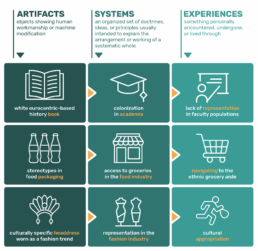Revealing and unlearning racialized design.
Diversity and inclusion are emerging as prominent topics on campuses in the United States. In the last few years, multiple institutions of higher learning have outlined diversity and inclusion goals and actions. Some of the challenges they have outlined to address are geared toward advancing a more positive campus climate. One common recommendation is to “infuse co-curricular programming and services with components that create engaging cultural competence learning opportunities for students”1and creating “new courses, curricula, and pedagogy are needed to respond to experiences of underrepresented and under served students.”
Our goal is to facilitate workshops in academia and with organizations in the public sector to identify forms of Racialized Design – design that perpetuates elements of racism. This toolkit walks participants through the design research process to assist in cultivating learning environments to further explore issues of race and racism.
Our goal is two fold: 1) to guide educators and students to utilize design research methods and processes to solve systemic problems, and 2) to inspire further work in the public sector to identify forms of Racialized Design in an organization.
These three hour workshops are focused on:
- Critically analyzing and identifying artifacts of Racialized Design; (more obvious)
- Shared experiences of microaggressions and implicit bias; (less obvious)
- Systemic forms of racism and how we and our culture perpetuates them. (essentially invisible)

We’d like to offer solutions on how these Racialized Designs can be introduced in dialogue while allowing critical thought and analysis of our culture. In these workshops we will foster a space to develop tools to create historical contexts, through a case study we provide, that would empower faculty to further understand these concepts. We’d hope that by completing this workshop participants would leave with the necessary tools to identify, develop, and integrate anti-racist concepts into their own environments. In doing so, this opens the door even wider for interdisciplinary processes to analyze real-world systemic racism. The methods we have defined highlights successful principles for innovation; creating a space for discovery, and “making” through the process of design research.
The period of discovery could include, but will not be limited to, personas, empathy mapping, heuristic analysis of existing work, the human ecology theory, and developing cross-disciplinary and community partnerships. Our plan is to break down project development using these five areas:
- Context: Elements of Racism
- Define: Methods and Theories to Define the Problem(s)
- Ideate: Artifact, System, or Experience
- Prototype: Low, Mid, and High Fidelity Design
- Test: Learning Objectives & Conceptual Understanding
Participant will leave the workshop with tools and resources to guide projects focused on anti-racism. The aim of the research is to provide a space to ideate on how to incorporate anti-racist themes into ANY space. We will learn from participants through successful ideas, pain points and limitations the participants have with the tools resources provided and their implementation of them. We hope this session will enlighten participants on new ways to identify how racist systems were created, how they are perpetuated, and in turn help to dismantle them.
Books
-
Mercer, Lisa, and Terresa Moses. Racism Untaught: Revealing and Unlearning Racialized Design (Cambridge, Massachusetts: MIT Press, Manuscript Release September 2023).
Chapters
-
Mercer, Lisa, and Terresa Moses, “Racism Untaught, Learning and Unlearning Racialized Design,” in Design Studies Practice. In press. (London, United Kingdom: Bloomsbury, 2022).
Journal Articles
- Moses, Terresa, and Lisa Mercer. “Examining the Influence of Positionality on the Facilitation of Design Processes,” Dialectic, vol. 3, no.1 (2022): DOI: 10.3998/dialectic.14932326.0003.105.
- Mercer, Lisa Elzey, and Terresa Moses. “Identifying Racialized Design to Cultivate a Culture of Awareness in Design,” The Design Journal, vol. 22, sup. 1 (2019): p. 1399-1407. DOI: 10.1080/14606925.2019.1594965.
